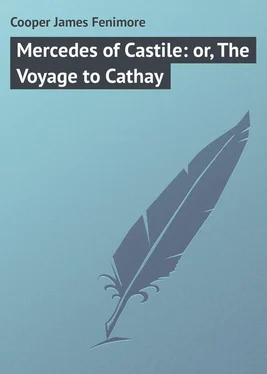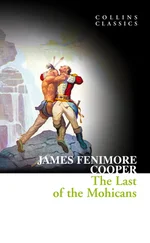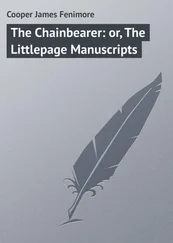James Cooper - Mercedes of Castile - or, The Voyage to Cathay
Здесь есть возможность читать онлайн «James Cooper - Mercedes of Castile - or, The Voyage to Cathay» — ознакомительный отрывок электронной книги совершенно бесплатно, а после прочтения отрывка купить полную версию. В некоторых случаях можно слушать аудио, скачать через торрент в формате fb2 и присутствует краткое содержание. Жанр: foreign_prose, на английском языке. Описание произведения, (предисловие) а так же отзывы посетителей доступны на портале библиотеки ЛибКат.
- Название:Mercedes of Castile: or, The Voyage to Cathay
- Автор:
- Жанр:
- Год:неизвестен
- ISBN:нет данных
- Рейтинг книги:4 / 5. Голосов: 1
-
Избранное:Добавить в избранное
- Отзывы:
-
Ваша оценка:
- 80
- 1
- 2
- 3
- 4
- 5
Mercedes of Castile: or, The Voyage to Cathay: краткое содержание, описание и аннотация
Предлагаем к чтению аннотацию, описание, краткое содержание или предисловие (зависит от того, что написал сам автор книги «Mercedes of Castile: or, The Voyage to Cathay»). Если вы не нашли необходимую информацию о книге — напишите в комментариях, мы постараемся отыскать её.
Mercedes of Castile: or, The Voyage to Cathay — читать онлайн ознакомительный отрывок
Ниже представлен текст книги, разбитый по страницам. Система сохранения места последней прочитанной страницы, позволяет с удобством читать онлайн бесплатно книгу «Mercedes of Castile: or, The Voyage to Cathay», без необходимости каждый раз заново искать на чём Вы остановились. Поставьте закладку, и сможете в любой момент перейти на страницу, на которой закончили чтение.
Интервал:
Закладка:
While the tongue of Ferdinand was thus instructing the prelate, the latter read in the expression of the monarch's eye, and in the coldness of his countenance, a meaning that his quick and practiced wits were not slow in interpreting. He signified his dutiful assent, however; received the names of his associates in the commission, of whom Isabella pointed out one or two, and then waited to join in the discourse.
"This project of Colon's is worthy of being more seriously inquired into," resumed the king, when these preliminaries were settled, "and it shall be our care to see that he hath all consideration. They tell me the honest navigator is a good Christian."
"I think him devotedly so, Don Fernando. He hath a purpose, should God prosper his present undertaking, to join in a new effort to regain the holy sepulchre."
"Umph! Such designs may be meritorious, but ours is the true way to advance the faith – this conquest of our own. We have raised the cross, my wife, where the ensigns of infidelity were lately seen, and Granada is so near Castile that it will not be difficult to maintain our altars. Such, at least, are the opinions of a layman – holy prelate – on these matters."
"And most just and wise opinions are they, Señor," returned the archbishop. "That which can be retained, it is wisest to seek, for we lose our labors in gaining things that Providence hath placed so far beyond our control, that they do not seem designed for our purposes."
"There are those, my Lord Archbishop," observed the queen, "who might argue against all attempts to recover the holy sepulchre, hearing opinions like these, from so high authority!"
"Then, Señora, they would misconceive that authority," the politic prelate hurriedly replied. "It is well for all Christendom, to drive the Infidels from the Holy Land; but for Castile it is better to dispossess them of Granada. The distinction is a very plain one, as every sound casuist must admit."
"This truth is as evident to our reason," added Ferdinand, casting a look of calm exultation out at a window, "as that yonder towers were once Abdallah's, and that they are now our own!"
"Better for Castile!" repeated Isabella, in the tones of one who mused. "For her worldly power better, perhaps, but not better for the souls of those who achieve the deed – surely, not better for the glory of God!"
"My much-honored wife, and beloved consort" – said the king.
"Señora" – added the prelate.
But Isabella walked slowly away, pondering on principles, while the eyes of the two worldings she left behind her, met, with the sort of free-masonry that is in much request among those who are too apt to substitute the expedient for the right. The queen did not return to her seat, but she walked up and down that part of the room which the archbishop had left vacant when he approached herself and her husband. Here she remained alone for several minutes, even Ferdinand holding her in too much reverence to presume to disturb her meditations, uninvited. The queen several times cast glances at Mercedes, and, at length, she commanded her to draw near.
"Daughter," said Isabella, who frequently addressed those she loved by this endearing term, "thou hast not forgotten thy freely-offered vow?"
"Next to my duty to God, Señora, I most consider my duty to my sovereign."
Mercedes spoke firmly, and in those tones that seldom deceive. Isabella riveted her eyes on the pale features of the beautiful girl, and when the words just quoted were uttered, a tender mother could not have regarded a beloved child with stronger proofs of affection.
"Thy duty to God overshadoweth all other feelings, daughter, as is just," answered the queen; "thy duty to me is secondary and inferior. Still, thou and all others, owe a solemn duty to your sovereign, and I should be unfit for the high trust that I have received from Providence, did I permit any of these obligations to lessen. It is not I that reign in Castile, but Providence, through its humble and unworthy instrument. My people are my children, and I often pray that I may have heart enough to hold them all. If princes are sometimes obliged to frown on the unworthy, it is but in humble and distant imitation of that Power which cannot smile on evil."
"I hope, Señora," said the girl, timidly, observing that the queen paused, "I have not been so unfortunate as to displease you; a frown from Your Highness would indeed be a calamity!"
"Thou? No, daughter; I would that all the maidens of Castile, noble and simple, were of thy truth, and modesty, and obedience. But we cannot permit thee to become the victim of the senses. Thou art too well taught, Doña Mercedes, not to distinguish between that which is brilliant and that which is truly virtuous" —
"Señora!" cried Mercedes, eagerly – then checking herself, immediately, for she felt it was a disrespect to interrupt her sovereign.
"I listen to what thou wouldst say, daughter," Isabella answered, after pausing for the frightened girl to continue. "Speak freely; thou addressest a parent."
"I was about to say, Señora, that if all that is brilliant is not virtuous, neither is all that is unpleasant to the sight, or what prudence might condemn, actually vicious."
"I understand thee, Señorita, and the remark hath truth in it. Now, let us speak of other things. Thou appearest to be friendly to the designs of this navigator, Colon?"
"The opinion of one untaught and youthful as I, can have little weight with the Queen of Castile, who can ask counsel of prelates and learned churchmen, besides consulting her own wisdom;" Mercedes modestly answered.
"But thou thinkest well of his project; or have I mistaken thy meaning?"
"No, Señora, I do think well of Colon's scheme; for to me it seemeth of that nobleness and grandeur that Providence would favor, for the good of man and the advancement of the church."
"And thou believest that nobles and cavaliers can be found willing to embark with this obscure Genoese, in his bold undertaking?"
The queen felt the hand that she affectionately held in both her own, tremble, and when she looked at her companion she perceived that her face was crimsoned and her eyes lowered. But the generous girl thought the moment critical for the fortunes of her lover, and she rallied all her energies in order to serve his interests.
"Señora, I do," she answered, with a steadiness that both surprised and pleased the queen, who entered into and appreciated all her feelings; "I think Don Luis de Bobadilla will embark with him; since his aunt hath conversed freely with him on the nature and magnitude of the enterprise, his mind dwelleth on little else. He would be willing to furnish gold for the occasion, could his guardians be made to consent."
"Which any guardian would be very wrong to do. We may deal freely with our own, but it is forbidden to jeopard the goods of another. If Don Luis de Bobadilla persevere in this intention, and act up to his professions, I shall think more favorably of his character than circumstances have hitherto led me to do."
"Señora!"
"Hear me, daughter; we cannot now converse longer on this point, the council waiting my presence, and the king having already left us. Thy guardian and I will confer together, and thou shalt not be kept in undue suspense; but Mercedes de Valverde" —
"My Lady the Queen" —
"Remember thy vow, daughter. It was freely given, and must not be hastily forgotten."
Isabella now kissed the pale cheek of the girl and withdrew, followed by all the ladies; leaving the half-pleased and yet half-terrified Mercedes standing in the centre of the vast apartment, resembling a beautiful statue of Doubt.
CHAPTER VII
"He that of such a height hath built his mind,
And reared the dwelling of his thoughts so strong
As neither fear nor hope can shake the frame
Of his resolved powers."
Интервал:
Закладка:
Похожие книги на «Mercedes of Castile: or, The Voyage to Cathay»
Представляем Вашему вниманию похожие книги на «Mercedes of Castile: or, The Voyage to Cathay» списком для выбора. Мы отобрали схожую по названию и смыслу литературу в надежде предоставить читателям больше вариантов отыскать новые, интересные, ещё непрочитанные произведения.
Обсуждение, отзывы о книге «Mercedes of Castile: or, The Voyage to Cathay» и просто собственные мнения читателей. Оставьте ваши комментарии, напишите, что Вы думаете о произведении, его смысле или главных героях. Укажите что конкретно понравилось, а что нет, и почему Вы так считаете.












